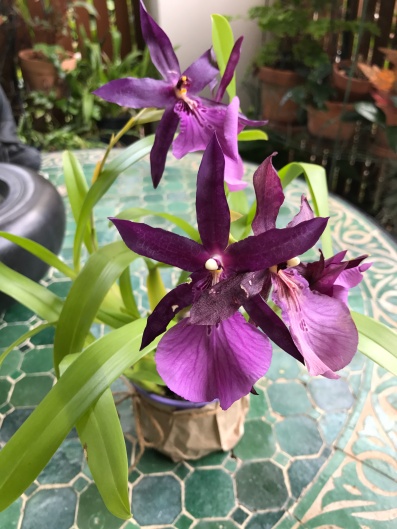
My ground orchid gift
My green-thumbed buddy dropped by with a gift the other day – a ground orchid! The Spathoglottis or ground orchid, is called a terrestrial orchid because unlike epiphitic varieties, it grows in the soil. Now, I already have a ground orchid another friend gifted me some years ago. It was descended from a plant belonging to her grandmother, so it held symbolic significance for her, and therefore for me, entrusted as I was with a plant of such sentimental importance.

Chinese ground orchid sans blooms
Despite its healthy appearance it’s failed to flower this season. Why? The new orchid in its carefully wrapped pot was in full bloom. Although the blooms are slightly different to the one I already have, the flowers are quite lovely: two-toned purple with tear drop marks on the lobellum or lip. I was anxious not to inadvertently place it where it too, might fail to flower.
And place turned out to be the problem with my resident orchid. Position, position, position as real estate salespersons avow! The orchid had flowered faithfully in that very same spot for the last few years. So what had changed?
When I took a long hard look, it was obvious. Neighbouring plants had grown to dominate the space and block the orchid from getting enough sun. Things never remain the same do they? Whether they be plants, gardens, people or society, the normal state of the world is one of flux. Current global and domestic political events attest to that.
For this reason, I decided I can’t rest on my laurels thinking a garden can ever be ‘finished’. It’s actually one of the joys of gardening. To be continually creating, meeting challenges, finding reserves I didn’t know I had to overcome the problems and then having the satisfaction of resolving them, albeit temporarily until the next one arises. To be always testing my mettle.
Conditions for thriving must be just right. Enough sustenance, and of the right kind. Sufficient light in order to flourish, in order to shine. These essential elements are not bestowed to then remain constant. They must be continually reviewed and adjusted to changing conditions.
You thought I was talking about my garden didn’t you? Well, I was, but also in service to a larger idea – life in general, whether in a social or personal form.
Hard won gains have to be defended. If necessary, they might have to be fought for and won all over again.
In my garden that means I may have to bend my back and make a big effort to clear out and prune, to regain balance and plant equity, to give my oppressed plants room to thrive again. Not just survive, but bloom at their very best. The garden as a whole benefits.
It’s no different in a social sense.
The ultimate end of all revolutionary social change is to establish the sanctity of human life, the dignity of man, [women and children] the right of every human being to liberty and well-being.
Never doubt that a small group of thoughtful, committed citizens can change the world; indeed, it’s the only thing that ever has. –Margaret Mead

Ground orchid fighting for space
l
l
l
the work of growth is never done! thanks for the post!
LikeLiked by 1 person
You are so right. Thanks for visiting Nancie
LikeLiked by 1 person
The part about gains having to be “fought for and won all over again” is so true, and not just with plants. I can think of more than a few such areas in a personal garden (attending to familial relationships that will blossom). And then there are the lesser gardens — housework, money matters, hygiene, appearance . . . The list goes on.
But it is curious that you cite Emma Goldman in a reflection on gardens, where anarchy is the norm without a well-organized gardener. I realize that there are times when gardens have to be dug up and restarted, and certainly the quotation itself presents a beautiful ideal, but now I am wondering about those gardens I mentioned. Outside forces could require starting over, as could my own bad choices, my own destructive choices. So probably placing Miss Goldman there was suitable, especially with that striking photograph to sum things up at the end.
Enjoyed reading this!
LikeLiked by 1 person
Hello Albert. I like the way you have pondered on my humble thoughts. I’m intrigued by your idea of gardens representing anarchy. I believe there is an ‘order’ to the plant world, not always obvious to we humans. I also think there are parallels between the plant world and social structures as you have acknowledged. Some plants are ascendant while others are in decline and so the cycle goes. It is the gardener (myself) who, so full of hubris, imagines she can impose her own order. Similarly, some ideas about how society should work prevail for a while and then are replaced by their opposites. There are casualties as a result. I was thinking specifically of the rising popularity of far right politics. The Emma Goldman quote expresses this beautifully. She says that despite whatever form the social revolution takes, it should always honour the sanctity of human life and further the liberty and dignity of humankind. A society, a garden or the plant world is always about balance in order to thrive. I am interested in your ideas on this.
LikeLike
Hi again, Robyn. Yes, Balance, I started learning about that way back in high school Latin class : “Est modus in rebus” and all that. Later I was introduced to the Greeks; e.g., Aristotle’s explanation of virtue as involving balance. Later still, friends told me about Buddha. So the concept has intellectual appeal. But it almost seems that, no matter which side one’s values lean towards, there is some innate drive away from balance — in individual lives as well as in societies.
Sadly from my perspective, Western culture has tipped that balance, first too far to the left, and now the weight is overloaded on the right. Effective gardeners don’t allow that to happen in their yards, but then they are sort of like benevolent dictators or philosopher-kings, having the power of the spade and the plantings. It’s an unfair comparison, I know. The key to gardening is probably a knowledge of plants, and not just how they thrive but also how they contribute to a harmonious and beautiful whole. But whoever has the key to human nature, they are not telling..
LikeLiked by 1 person
Albert, you speak of balance and the swinging pendulum of Western culture. But hasn’t it always been thus? Cultures ebb and cultures flow. The Greeks had their golden age and so to the Egyptians.
I like the idea of being a philosopher king/queen gardener but don’t think for a minute I am in command of anything for long. 🙂 As for the key to human nature, we may never find it. It’s one frontier that will probably never be conquered. It’s fun to contemplate though.
LikeLike
Loved this blog Robyn for many reasons and what a magnificent orchid! Your garden provides you with a font of metaphors. 😍
LikeLiked by 1 person
Thank you dear Ros. You have exposed me! My garden offers a lens (not always rose coloured), a way of ordering my thoughts and observations, a way of thinking about the social world. Thank you for visiting.
LikeLike
Change is a big part of gardening I’d guess, Robyn. Life just won’t be kept down. 🙂
LikeLiked by 1 person
And thank goodness for that.
LikeLiked by 1 person
Such a gorgeous orchid, Robyn. You’re so right that nothing worthwhile is achieved without effort and fortitude.
LikeLiked by 1 person
So many lessons in my garden. Thanks for visiting!
LikeLiked by 1 person
Reminds me of Chance the gardener in “Being There.” 😘
LikeLiked by 1 person
I was not familiar with that movie but have looked it up and plan to watch it. Always been a Peter Sellers fan. Thanks for the reference.
LikeLiked by 1 person
Ah, it’s great. Shirley McLaine is fabulous and I love the premise of how people are so easily duped. Enjoy it!😆
LikeLiked by 1 person
It’s so lovely to see the bush orchid is surviving and I’m sure you’ll know just what to do so it can thrive again Robyn. Ours are in pots and flowering profusely at the moment. I think there might be some magic worm juice behind that. I’ll have to ask the gardener. 🙂
LikeLiked by 1 person
Thanks for your vote of confidence Gail. Having spoken to my green-thumbed buddy we decided the orchid needs a change of scenery. A little more elbow room, so to speak 🙂
Gardening is full of challenges.
I’m pleased to hear yours are blooming well.
LikeLike
I thoroughly enjoyed this post, Robyn and the parallels drawn between gardens and life. Excellent choices in quotes too.
LikeLiked by 1 person
Thank you Steph! There are so many ways of thinking about life aren’t there? The garden and nature are just two of them.
LikeLiked by 1 person
Yes there are and your analogies are always on target.
LikeLiked by 1 person
You’re very generous. ☺️
LikeLiked by 1 person
😃
LikeLike
Well said!
LikeLiked by 1 person
I love your garden!
LikeLiked by 1 person
Thank you Dan. I’m glad you took time to visit.
LikeLike
Don’t worry.
LikeLiked by 1 person